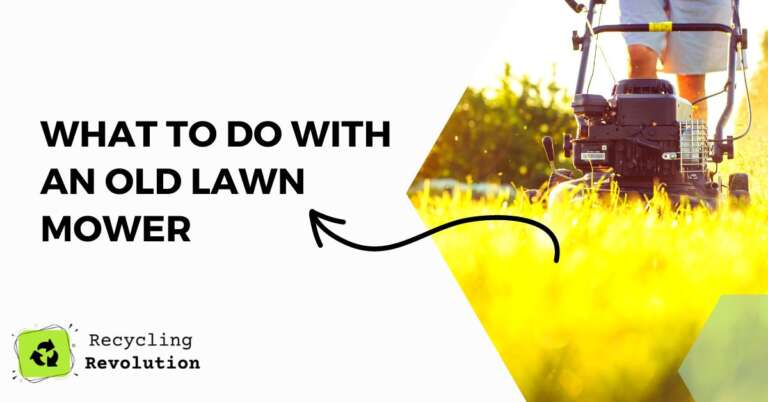Lawns are the metaphorical ‘front page’ of our homes. As a passionate gardener and someone who’s loves maintaining my yard, I know that the equipment we use plays a vital role in achieving the verdant perfection we crave.
One of the most common tools? The humble lawn mower.
But what happens when it gives up the ghost? When those blades stop spinning and the engine sputters its last? What do you do with an old lawn mower?
tl;dr: Don’t toss your old lawn mower! Consider repairing, repurposing, recycling, or donating it. Whichever path you choose, it’s all about extending its lifecycle and minimizing environmental waste.
The Legacy of Your Lawn Mower
Understanding the life and role of a lawn mower isn’t just about the clippings it leaves behind. According to a study by the Environmental Protection Agency (EPA), mowers account for a significant chunk of our garden-related emissions.
The longer we can keep them out of the landfill, the better for Mother Earth.
Repair It: The Art of Second Chances
I recommend starting with the simplest question: Can it be repaired? Often, a non-functioning lawn mower has minor issues like clogged filters, spark plug problems, or blade dullness.
With a bit of elbow grease, or the help of a local mechanic, you might find your mower humming away like its old self. A bonus? Repairing often turns out to be more cost-effective than replacing.
Note: Regular maintenance like changing the oil and cleaning the undercarriage can extend your mower’s life considerably.
Repurpose: Unleashing Your Creative Side
If your mower’s mowing days are truly over, why not transform it? With a bit of imagination, you can repurpose old mowers into:
- Planters: Remove the engine, and you’ve got a unique pot.
- Art: Some people turn them into quirky garden sculptures.
- Furniture: Believe it or not, I’ve seen mowers transformed into garden benches!
Recycle: Giving Back to Earth
Recycling should always be on your radar. Most mowers are made up of recyclable metals that can be melted down and reshaped for other purposes. Some local recycling centers accept old lawn mowers, but remember to drain any remaining oil or gasoline first.
According to the National Recycling Coalition, recycling metals like those in lawn mowers saves up to 74% energy compared to producing them from raw materials.
Note: Before recycling, always remove non-metal parts like rubber tires and plastic components.
Donate: The Gift that Keeps on Mowing
If you believe the mower might still have a few good years left in it, but you’ve moved on, consider donation. Schools with agricultural programs, community gardens, or local nonprofits might find it beneficial.
Sell or Trade-in: Make a Few Bucks
Many local dealerships or gardening centers offer trade-ins for old equipment, giving you a discount on a new purchase. Alternatively, you can sell it online on platforms like Craigslist, eBay, or Facebook Marketplace.
You’d be surprised how many DIY enthusiasts are looking for an old lawn mower project.
Safety First
Regardless of your choice, always ensure that the mower is safe to handle. This means:
- Draining fuel: Old gasoline can degrade and become a fire hazard.
- Disconnecting the spark plug: This ensures it doesn’t accidentally start up.
- Handling blades with care: Even old blades can be sharp.
Understanding Environmental Impacts
When we think about our ecological footprints, the lawn mower is rarely the first offender that springs to mind. Yet, the manufacture, use, and disposal of garden equipment, including lawn mowers, contribute to environmental degradation in subtle ways.
Each lawn mower produced demands materials – metals, plastics, and rubber – which all require energy-intensive processes.
I recommend being mindful of these impacts, as it adds another layer to why it’s essential to thoughtfully handle an old mower.
Barter or Exchange
While selling or trading-in was briefly touched upon, there’s also an old-fashioned system that’s making a comeback: bartering. It’s community-driven and can be a fantastic way to exchange goods without involving money.
Maybe someone in your neighborhood needs a mower for parts and has something you might find useful. Platforms like Nextdoor or even local community boards can be excellent places to start.
Dismantling and Learning
If you’re someone who loves to tinker or has kids who show an interest in mechanics, why not dismantle the old lawn mower? It’s an excellent way to understand machinery, and who knows, perhaps in the process, you might find that a small fix can bring it back to life.
Note: Always ensure safety first. Use gloves and protective eyewear when dismantling any machinery.
Environmental Art Projects
Beyond just garden sculptures, old mowers can find their place in larger art projects. Many environmental artists use discarded items to create installations that comment on consumerism and waste.
If you’re artistically inclined, or know someone who is, this could be an avenue to explore.
Awareness and Education
One of the best ways to deal with an old lawn mower, or any discarded item for that matter, is to use it as an educational tool. Schools, community centers, and workshops can use it to teach about sustainability, mechanics, or even art.
An old mower can spark discussions about consumer habits, longevity of products, and the importance of maintenance and repair.
Sourcing Parts
Your old lawn mower could be a gold mine of parts for someone else. Blades, wheels, handles, and even nuts and bolts can be salvaged and used in other machinery.
I recommend listing the mower online as a ‘parts-only’ sale. There’s a growing community of repair enthusiasts who’d jump at the chance to source genuine parts.
Community Resourcefulness
Some communities have established tool libraries or repair cafes. These are places where people can borrow tools or learn to fix their items.
Donating your old lawn mower to such places ensures that it either gets a new lease of life or becomes a valuable resource for teaching others.
Environmental Disposal Services
In case your mower is beyond all the above avenues and you’re considering disposal, ensure you use a service that specializes in disposing of garden equipment.
They’d ensure that harmful residues (like oils or degraded plastics) are handled appropriately, minimizing environmental harm.
Remember the Small Gestures
At the end of the day, the most crucial action isn’t necessarily the grand gestures but the small, consistent ones. By choosing to responsibly handle an old lawn mower, you’re taking a step towards a more sustainable and eco-conscious lifestyle.
It’s these small decisions that, collectively, pave the way for a greener future.
Conclusion
An old lawn mower needn’t be a problem. Whether you decide to repair, repurpose, recycle, donate, or sell, it’s all about finding the most responsible and creative way to extend its lifecycle. Your little green patch of earth will thank you for it.
FAQs
Is it expensive to repair a lawn mower?
It depends on the issue. Simple repairs like changing filters or spark plugs can be affordable. More complex issues with the engine or transmission might be pricier. Always get a quote before deciding.
Can all parts of a mower be recycled?
Most metal parts can. However, certain components like rubber, plastic, or residual oils need to be disposed of properly.
Are there organizations that pick up old mowers for donation?
Some local charities or community gardens might offer pick-up services. It’s best to call and check.
Remember, it’s not just about what to do with an old lawn mower, but how you can do it in a way that’s both eco-friendly and resourceful. Happy mowing!

